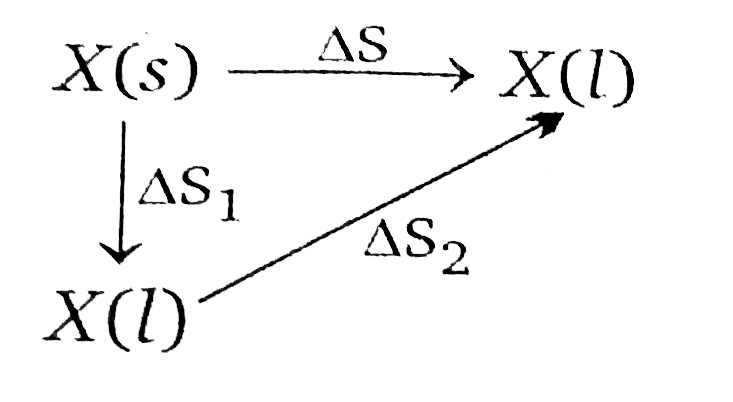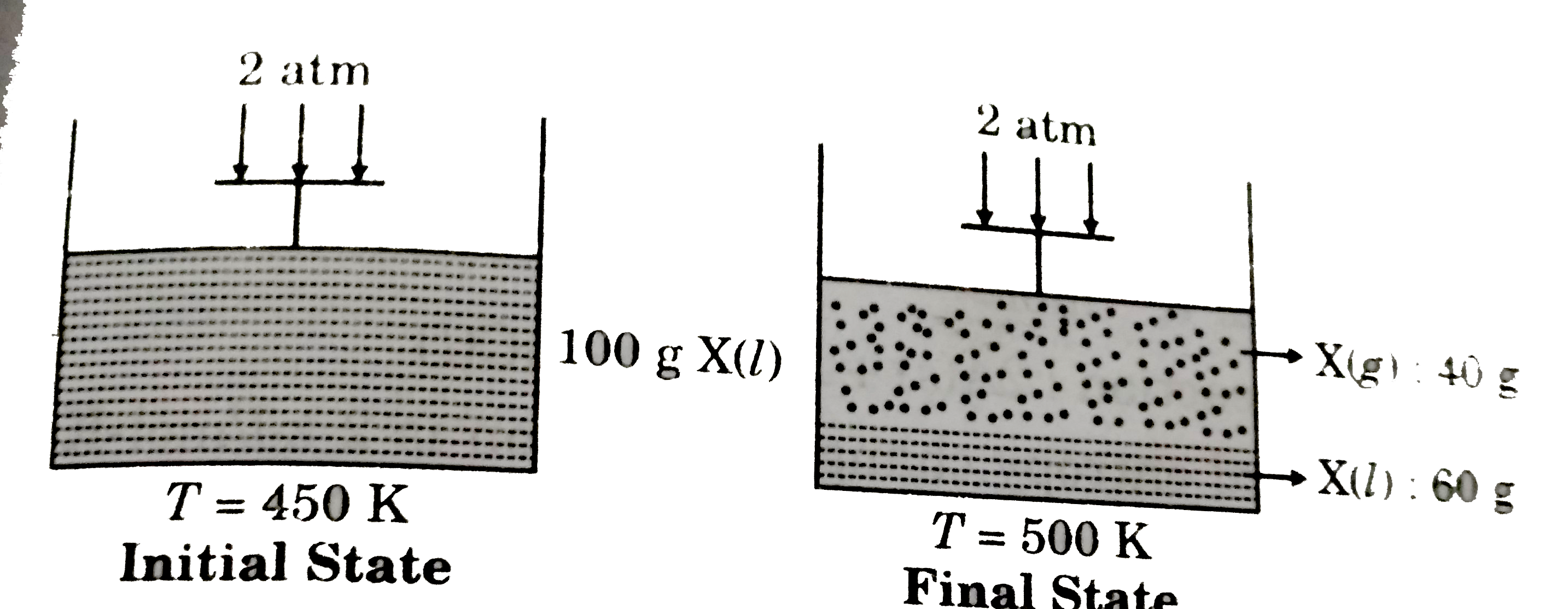Calculate for following process :
Given : Melting point of
The correct Answer is:B

,
Topper's Solved these Questions
- BOOK - NARENDRA AWASTHICHAPTER - THERMODYNAMICSEXERCISE - Level 1 (Q.1 To Q.30)6videos
THERMODYNAMICS
- BOOK - NARENDRA AWASTHICHAPTER - THERMODYNAMICSEXERCISE - Level 1 (Q.31 To Q.60)2videos
THERMODYNAMICS
- BOOK - NARENDRA AWASTHICHAPTER - STOICHIOMETRYEXERCISE - Level 3 - Subjective Problems20videos
STOICHIOMETRY
Similar Questions
The external pressure 2 atm is applied on frictionless movable piston, fitted in a vessel containing 100 g of X(g) at 450 K. now heat is sulplied keeping pressure constant till 40 g of Xis evaporated to to from X(g) at 500 K (boinling poing ). Calculate change in internal (ΔU) energy in kJ for overall process. Assume vapour of X (l) behaves like an ideal gas.

Given : Molar hect capacity of X (l) =60 J/mol K: ΔHvaporisation=30kJ/mol,ΔHvaporisation=30kJ/mol,R=8.3J/mol-K
At weight of X = 20g/mol.View SolutionThe external pressure 2 atm is applied frictionless movable piston, fitted in vessel containing 100 g of
X(l) at 450 K. Now heat is supplied keeping pressure constant till 40 g of X is evaporated to from X(g)
at 500 K (boiling pont ) . Calculate charge in internal (ΔU) energy in kJ for overall processe.
Assume vapour of X(l) behaves like an ideal gas.

Given : Molar heat capacity of X(l)=60J/mol.K:DeltaH_(vaporisationm) = 30 kJ// mol : R = 8.3 J// mol- K <br>At.weitghofX= 20 G//MOL.
[ Fill your answer by mutiplying it with 100.]View Solution
Knowledge Check
- Question 1 - Select One
What is the melting point of benzene if ΔHfusion=9.95kJ/mol and ΔSfusion=35.7J/K−mol
A278.7∘CB278.7∘KC300 KD298 K - Question 2 - Select One
What is the melting point of benzene if ΔHfusion=9.95kJ//molandΔSfusion35.7J/K−mol ?
A278.7∘CB278.7KC300 KD298 K - Question 3 - Select One
What is the melting point of benzene if ΔHfusion=9.95kJ/mol and ΔSfusion=35.7J/K−mol
A278.7∘CB278.7KC300 KD298 K
Calculate entropy charge
H2O(l,1atm,100∘C) rarr H2O(g,1 atm,110∘)
H2O(l,2 atm,100∘)rarr H2O(g,2 atm,100∘)
ΔHvap=40kJ/mole" "Cp(l)=75J/mole/K" "Cp(g)=35J/mole/KView SolutionThe enthalpy change for vapourization of liquid ‘A’ at 200 K and 1 atm is 22 kJ/mol. Find out ΔSvapourisation for liquid ‘A’ at 200 K ? The normal Boiling point of liquid ‘A’ is 300 K.
A(l)[200K,1atm]→A(g)[200K,1atm]
Given : Cp,m(A,g)=30J/mol−K,CP,m(A,l)=40J/mol−K
Use : ln (3/2) = 0.405View SolutionCalculate DeltaH (in kcal) for the following phase transformation :
A (s,1 bar, 200K) rarr A (g, 1 bar ,200 K)
Standard melting poing of A = 200 K
Standard boioling poing of A = 300K
Standard boiling ping of A = 300 K
Latent heat of fusion of A at 200 K = 60cal/g
Latent heat of vaporisation of A at 300K=410cal/g Molar mass of A = 50g/mole
CVm of A (s)= 5cal K−1 mol−1
CVm of A (l) = 10calK−1mol−1
CVm of A (g)=3calK−1mol−1
R=2calK−1mol−1View SolutionCalculate entropy change
H2O(1,1atm,100∘C)→H2O(g,1atm,110∘C)
H2O(1,1atm,100∘C)→H2O(g,2atm,100∘C)
ΔHvap=40kJ/mol Cp(1)=75J/mol/K
Cp(g)=35J/mol/KView SolutionCalculate the change in enthalpy for the following process at 1 atm
H2O(1,50∘C)→H2O(g,150∘C) given that ΔHv at 100∘C is 40.7kJmol−1
Cp(H2O,l)=75.0Jmol−1K−1
Cp(H2O,g)=33.3Jmol−1K−1View Solution

